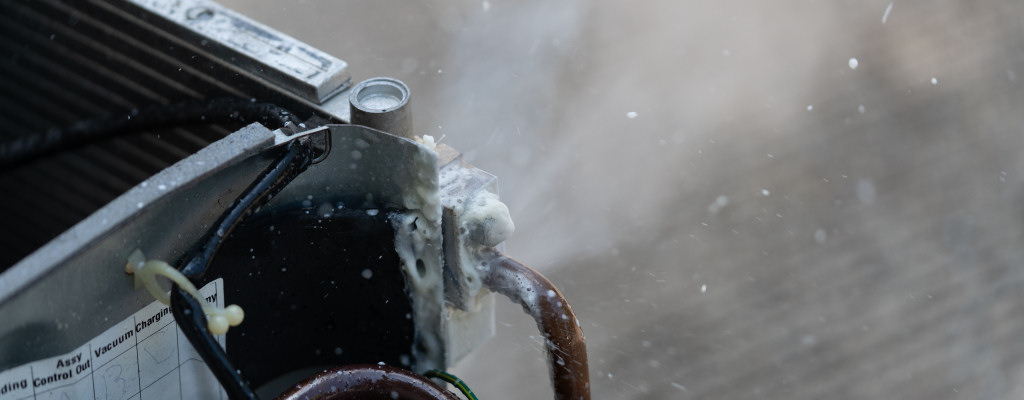First things first: If you observe a refrigerant leak – or simply suspect one – turn off your AC unit immediately and call us out for a visit. DO NOT attempt to seal the leak yourself, as this is potentially dangerous and you could damage your air conditioning system.
In this guide, we’ll explain why AC systems sometimes leak refrigerant and the signs you should keep an eye (and ear!) out for.
Why is AC refrigerant so important?
Refrigerant is an essential substance used in home air conditioners. While its normal state is liquid, refrigerant helps absorb heat, making your home nice and cold. During the cooling process, refrigerant converts to a gas and back to a liquid, over and over again.
You might be more familiar with AC refrigerant’s common names – Freon and Puron. Freon refers to the now-obsolete refrigerant, R-22. If your AC unit is over ten years old, it probably uses R-22. Puron, on the other hand, is the new stuff – R-410A. It’s far more environmentally friendly and safe, which is why it replaced R-22.
What can cause a refrigerant leak?
A wide array of conditions can cause your AC unit to leak refrigerant, and you’re most likely to discover a leak because your home has gotten uncomfortably warm. To keep this guide on the short side, we’ll describe the most common causes. If you’re in doubt about a leak, play it safe! Shut off your AC and call us here at Hey Neighbor right away.
Improper installation
Refrigerant leaks sometimes occur due to poor installation of some parts of your HVAC system. For instance, the most common cause is due to overtightening connections. The wise homeowner only allows licensed and factory-trained HVAC professionals to install their cooling equipment to avoid leaks and other issues.
If you suspect an incorrect installation, here are some warning signs:
• Warm air coming from your vents
• Your thermostat is in the wrong place or doesn’t work well
• Weak or inconsistent airflow inside your home
• Abnormally high energy bills
• Unusually noisy operation
Have our expert and certified neighborly team visit to inspect your system if you notice any of these red flags. Of course, we always strive to keep our customers’ HVAC systems working well, but you might consider replacing an older unit to achieve maximum performance and comfort.
Metal degradation
Time and the elements can wreak havoc on your HVAC system. For example, metal erosion can create tiny holes that allow refrigerant to leak out. Also, an air conditioning system’s condenser unit is typically outdoors, so there’s a strong chance of degradation and damage from the sun and inclement weather.
Additionally, the copper coils in your system corrode over time; the thinner the copper lines, the faster they disintegrate. If you suspect coil corrosion, call our professionals at Hey Neighbor as soon as possible for AC repair. Otherwise, your entire AC system may need to be replaced if the issue is neglected for too long.
Manufacturer defects
A common misconception is that a new air conditioning system won’t have any issues if it’s installed correctly. That’s not always true, though. There’s the possibility of manufacturing flaws with any product. A defect can cause a refrigerant leak, among other issues. Low efficiency and high energy bills are good indicators that something isn’t right.
Typically, a new unit with factory defects must be replaced. Therefore, a warranty is essential, potentially saving you from the massive expense of a new-unit failure replacement. That’s why we’re proud to be a Trane Comfort Specialist dealer – because of Trane’s no-hassle replacement guarantee!
Normal wear and tear
The long wear-down over time usually becomes apparent on older units. For example, the seals in air conditioning systems can become cracked and brittle over time, potentially causing a refrigerant leak. In addition, outdoor elements may rust and eventually allow refrigerant to escape.
How can I tell if my AC system is leaking refrigerant?
Your cooling system is a complex device composed of many parts that work together, including an evaporator coil, fans, refrigerant, and ductwork. Your air conditioner or heat pump needs refrigerant to heat or cool your home. A loss of refrigerant can render your system unable to reach the desired temperature. This can cause other issues, including:
Longer time to cool
A refrigerant leak makes your AC system or heat pump work harder, especially during the summer months. It can take twice as long – or even longer – for your house to cool down because the unit isn’t blowing sufficiently cooled air. It’s frustrating and can make your home feel unbearably hot.
High energy bills
Think the electric company got your monthly bill wrong? Think again. A high electric bill is a clear warning that something is wrong, and a refrigerant leak is the most likely culprit in the summer months. Your AC system struggles and uses much more energy to try and keep your house cool.
To stop the money waste, let our professional, factory-trained technicians evaluate what’s causing your electric bill to skyrocket. If we determine that a refrigerant leak is causing your air conditioner to use more energy, we’ll recommend the best action for you. Remember, just adding more refrigerant probably won’t completely resolve any underlying problems. It’s like having a nail in your tire – refill it and it still leaks without fixing the problem first.
Excessive indoor humidity
That sticky feeling is another clear indication that there isn’t enough refrigerant. Moist conditions can possibly cause other problems like mold, and nobody wants that! A properly running unit produces cool, conditioned air that keeps your indoor humidity at an ideal level.
If your house feels unusually damp, have our local experts check the AC refrigerant to ensure there isn’t a leak. If a leak exists, we’ll find the cause, fix it if possible, and re-add the proper amount of refrigerant. If we can’t repair the leak, our neighborly Comfort Consultants will help your family get the perfect new AC system for your home.
A hissing sound
No, that’s not a snake. (Well, we suppose it could be – so be safe!) A hissing sound coming from your AC indicates that something is very wrong. Typically, it announces the presence of a leak somewhere. If you hear hissing and bubbling sounds, too, it’s a sign of a refrigerant leak. Remember the liquid-to-gas cycle we mentioned above? Let one of our professionals check your unit to determine precisely where the refrigerant leak is coming from.
Neighborly Tip: If you hear hissing, stop trying to find the leak yourself. You don’t want to expose yourself to toxic refrigerant gas. Instead, turn the system off and call us immediately.
Frozen evaporator coils / copper lines outside
Losing refrigerant causes a cooling effect that results in a frozen system. Blocked vents and air ducts can also cause your AC’s evaporator coil to freeze. We recommend always keeping air flowing freely by refraining from placing a rug or furniture over your vents and registers.
Is a refrigerant leak dangerous?
Direct exposure to a refrigerant leak is harmful to your health and the atmosphere. It contains toxic chemicals that can affect air quality and damage your respiratory system. It’s odorless, tasteless, and a health hazard. Refrigerant poisoning can cause:
• Headaches
• Seizures
• Brain fog
• Unconsciousness
• Nausea
• Vomiting
• Difficulty breathing
• Irregular heartbeat
• Irritated skin and eyes
• Fluid in the lungs
Seek medical help immediately if you’ve been exposed to a refrigerant leak and display any of these symptoms to avoid organ damage or death. Exposure to an air conditioner leaking refrigerant is nothing to ignore.
Can I top off my R-22 system with R-410A?
Please DO NOT do this. Mineral oil-based R22 is incompatible with synthetic-based R410A. Combining the two will cause extreme damage to your air conditioner and is potentially dangerous. Think of it like using synthetic to top off a car that uses regular oil. So, again – please don’t do it.
Should I have my old R-22 unit refilled?
There are a couple of reasons an R-22 leak means it’s time to replace the AC unit. First, R-22 refrigerant costs well over $100 per pound and is increasing daily. The average unit needs at least 2-5 pounds of refrigerant, so that’s a pricey investment – and one that’s not likely to buy you much more life from that old AC. Second, R-22 is very difficult to find, much less have your AC refilled with. It isn’t produced anymore in the USA because it has a high potential to harm the ozone layer.
What should I do if I suspect a refrigerant leak?
Think you have a leak? Please, DO NOT attempt to fix the issue on your own. Instead, call Hey Neighbor Heating & Cooling at 844-HEY-NEIGHBOR for emergency air conditioning repair services and regular AC tune-up service to check for refrigerant leaks and keep your unit in tip-top shape. We also replace AC systems and offer a wide array of other HVAC services to keep your family comfortable and safe. That’s how neighbors should treat neighbors!™


Comments are closed